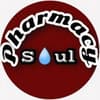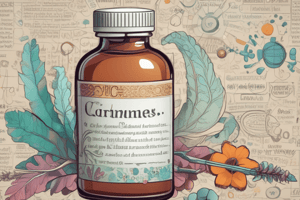Podcast
Questions and Answers
Which medication is a corticosteroid that is commonly used to treat inflammation?
Which medication is a corticosteroid that is commonly used to treat inflammation?
- Metformin
- Methimazole
- Prednisone (correct)
- Levothyroxine
What is the primary purpose of Desmopressin in medical treatment?
What is the primary purpose of Desmopressin in medical treatment?
- Pain relief
- Antifungal action
- Diuretic effect
- Hormone replace for diabetes insipidus (correct)
Which of the following medications is NOT classified as an antihistamine?
Which of the following medications is NOT classified as an antihistamine?
- Loratadine
- Celecoxib (correct)
- Diphenhydramine
- Cetirizine
Which of the following medications is primarily used to manage gastric acid reflux?
Which of the following medications is primarily used to manage gastric acid reflux?
Spironolactone is mainly used as which type of medication?
Spironolactone is mainly used as which type of medication?
Which medication is indicated for acute allergic reactions?
Which medication is indicated for acute allergic reactions?
Which of the following medications is used as a symptom support for Cushing’s syndrome?
Which of the following medications is used as a symptom support for Cushing’s syndrome?
What is the common suffix for steroid medications that indicates their classification?
What is the common suffix for steroid medications that indicates their classification?
Which of the following is a diuretic commonly prescribed for managing hypertension?
Which of the following is a diuretic commonly prescribed for managing hypertension?
Which medication is indicated for the treatment of allergic rhinitis?
Which medication is indicated for the treatment of allergic rhinitis?
Which of the following medications is a proton pump inhibitor used to treat gastroesophageal reflux disease?
Which of the following medications is a proton pump inhibitor used to treat gastroesophageal reflux disease?
What medication is primarily used as an antidote for acetaminophen overdose?
What medication is primarily used as an antidote for acetaminophen overdose?
Flashcards are hidden until you start studying
Study Notes
Endocrine II
- Methimazole: Antithyroid medication used to manage hyperthyroidism.
- Levothyroxine: Synthetic thyroid hormone replacement therapy for hypothyroidism.
- Desmopressin: Synthetic analog of antidiuretic hormone (ADH) used to treat diabetes insipidus and bedwetting.
- Hypertonic 3% NaCl: Administered for severe hyponatremia, helps restore sodium levels.
- Spironolactone: Potassium-sparing diuretic used to treat conditions like hypertension and heart failure.
- D5NS fluid: Combination of dextrose and normal saline, used for hydration and electrolyte support.
- Cushing’s symptom support: Includes insulin for high blood sugar, Metformin for insulin resistance, and diuretics, beta blockers, and calcium channel blockers for symptom management.
- Steroids with -sone suffix: Indicate glucocorticoids, play key roles in inflammation and immune response. Examples include:
- Hydrocortisone: Corticosteroid for adrenal insufficiency and inflammation.
- Fludrocortisone: Mineralocorticoid for adrenal insufficiency and orthostatic hypotension.
- Prednisone: Commonly prescribed glucocorticoid for inflammation.
- Prednisolone: Active metabolite of prednisone, used for various autoimmune conditions.
- Methylprednisolone: Anti-inflammatory and immunosuppressant, used in severe asthma and allergic reactions.
- Beclomethasone: Inhaled corticosteroid for asthma and allergic rhinitis.
- Dexamethasone: Strong anti-inflammatory steroid used for various conditions.
- Cortisone: Precursor to cortisol, used for its anti-inflammatory properties.
- Fluticasone: Inhaled corticosteroid for asthma and COPD management.
Immune+
- Cyclosporine: Immunosuppressant used to prevent organ transplant rejection and treat autoimmune diseases.
- Tacrolimus: Potent immunosuppressant used in organ transplantation and certain skin conditions.
- Epinephrine: Emergency treatment for severe allergic reactions (anaphylaxis).
- Methotrexate: Antimetabolite used for various cancers and autoimmune diseases.
- Diphenhydramine: Antihistamine for allergy relief and used as a sedative.
- Hydroxyzine: Antihistamine with anxiolytic properties, used for anxiety and allergic reactions.
- Loratadine: Non-sedating antihistamine for allergy relief.
- Fexofenadine: Second-generation antihistamine with low sedation risk, used for allergies.
- Cetirizine: Antihistamine effective for allergies and chronic urticaria, moderate sedation.
- Naproxen and naproxen sodium: Nonsteroidal anti-inflammatory drugs (NSAIDs) for pain relief.
- Ibuprofen: Common NSAID used for pain, inflammation, and fever reduction.
- Celecoxib: COX-2 selective NSAID used for osteoarthritis and rheumatoid arthritis.
- Acetaminophen: Analgesic and antipyretic, lacks anti-inflammatory properties.
- Aspirin: NSAID used for pain relief and as an antiplatelet agent.
- Acetylcysteine: Mucolytic agent and antidote for acetaminophen overdose.
GI
- Talicia: Combination antimicrobial medication for eradication of Helicobacter pylori.
- Famotidine: H2 receptor antagonist for reducing stomach acid and treating GERD.
- Ranitidine: H2 blocker, previously used for gastric ulcers and GERD management.
- Cimetidine: H2 antagonist, used for acid-reducing therapy.
- Omeprazole: Proton pump inhibitor (PPI) for gastric acid reduction.
- Esomeprazole: R-enantiomer of omeprazole, used for GERD and peptic ulcers.
- Pantoprazole: PPI for reducing stomach acid production.
- Lansoprazole: PPI used for treating erosive esophagitis and stomach ulcers.
- Calcium carbonate: Antacid that neutralizes stomach acid, also a calcium supplement.
- Magnesium hydroxide: Antacid and laxative, used for constipation relief.
- Aluminum hydroxide: Antacid used for acid neutralization in the stomach.
- Sucralfate: Mucosal protectant for treating ulcers and protecting the stomach lining.
- Bismuth subsalicylate: Antidiarrheal and gastric distress relief, known as Pepto-Bismol.
- Psyllium: Natural fiber supplement for constipation and improving bowel regularity.
- Docusate sodium: Stool softener aiding in bowel movements.
- Bisacodyl: Stimulant laxative for short-term constipation relief.
- Senna: Herbal laxative, promotes bowel movements.
- Polyethylene glycol: Osmotic laxative for constipation management.
- Mineral oil: Lubricant laxative for easing bowel movement.
- Loperamide: Antidiarrheal medication that slows gut movement.
- Antiemetics: Include medications like lorazepam, beclomethasone, antihistamines, and scopolamine for nausea and vomiting.
- Cannabis: Used for nausea control and appetite stimulation in certain conditions.
- Ondansetron: 5-HT3 receptor antagonist used to prevent nausea and vomiting.
- Metoclopramide: Prokinetic agent, stimulates gastric motility and reduces nausea.
- Promethazine: Antihistamine used for motion sickness and nausea.
- Hyoscyamine: Anticholinergic for gastrointestinal spasms and discomfort.
Endocrine II
- Methimazole: Antithyroid medication used to manage hyperthyroidism.
- Levothyroxine: Synthetic thyroid hormone replacement therapy for hypothyroidism.
- Desmopressin: Synthetic analog of antidiuretic hormone (ADH) used to treat diabetes insipidus and bedwetting.
- Hypertonic 3% NaCl: Administered for severe hyponatremia, helps restore sodium levels.
- Spironolactone: Potassium-sparing diuretic used to treat conditions like hypertension and heart failure.
- D5NS fluid: Combination of dextrose and normal saline, used for hydration and electrolyte support.
- Cushing’s symptom support: Includes insulin for high blood sugar, Metformin for insulin resistance, and diuretics, beta blockers, and calcium channel blockers for symptom management.
- Steroids with -sone suffix: Indicate glucocorticoids, play key roles in inflammation and immune response. Examples include:
- Hydrocortisone: Corticosteroid for adrenal insufficiency and inflammation.
- Fludrocortisone: Mineralocorticoid for adrenal insufficiency and orthostatic hypotension.
- Prednisone: Commonly prescribed glucocorticoid for inflammation.
- Prednisolone: Active metabolite of prednisone, used for various autoimmune conditions.
- Methylprednisolone: Anti-inflammatory and immunosuppressant, used in severe asthma and allergic reactions.
- Beclomethasone: Inhaled corticosteroid for asthma and allergic rhinitis.
- Dexamethasone: Strong anti-inflammatory steroid used for various conditions.
- Cortisone: Precursor to cortisol, used for its anti-inflammatory properties.
- Fluticasone: Inhaled corticosteroid for asthma and COPD management.
Immune+
- Cyclosporine: Immunosuppressant used to prevent organ transplant rejection and treat autoimmune diseases.
- Tacrolimus: Potent immunosuppressant used in organ transplantation and certain skin conditions.
- Epinephrine: Emergency treatment for severe allergic reactions (anaphylaxis).
- Methotrexate: Antimetabolite used for various cancers and autoimmune diseases.
- Diphenhydramine: Antihistamine for allergy relief and used as a sedative.
- Hydroxyzine: Antihistamine with anxiolytic properties, used for anxiety and allergic reactions.
- Loratadine: Non-sedating antihistamine for allergy relief.
- Fexofenadine: Second-generation antihistamine with low sedation risk, used for allergies.
- Cetirizine: Antihistamine effective for allergies and chronic urticaria, moderate sedation.
- Naproxen and naproxen sodium: Nonsteroidal anti-inflammatory drugs (NSAIDs) for pain relief.
- Ibuprofen: Common NSAID used for pain, inflammation, and fever reduction.
- Celecoxib: COX-2 selective NSAID used for osteoarthritis and rheumatoid arthritis.
- Acetaminophen: Analgesic and antipyretic, lacks anti-inflammatory properties.
- Aspirin: NSAID used for pain relief and as an antiplatelet agent.
- Acetylcysteine: Mucolytic agent and antidote for acetaminophen overdose.
GI
- Talicia: Combination antimicrobial medication for eradication of Helicobacter pylori.
- Famotidine: H2 receptor antagonist for reducing stomach acid and treating GERD.
- Ranitidine: H2 blocker, previously used for gastric ulcers and GERD management.
- Cimetidine: H2 antagonist, used for acid-reducing therapy.
- Omeprazole: Proton pump inhibitor (PPI) for gastric acid reduction.
- Esomeprazole: R-enantiomer of omeprazole, used for GERD and peptic ulcers.
- Pantoprazole: PPI for reducing stomach acid production.
- Lansoprazole: PPI used for treating erosive esophagitis and stomach ulcers.
- Calcium carbonate: Antacid that neutralizes stomach acid, also a calcium supplement.
- Magnesium hydroxide: Antacid and laxative, used for constipation relief.
- Aluminum hydroxide: Antacid used for acid neutralization in the stomach.
- Sucralfate: Mucosal protectant for treating ulcers and protecting the stomach lining.
- Bismuth subsalicylate: Antidiarrheal and gastric distress relief, known as Pepto-Bismol.
- Psyllium: Natural fiber supplement for constipation and improving bowel regularity.
- Docusate sodium: Stool softener aiding in bowel movements.
- Bisacodyl: Stimulant laxative for short-term constipation relief.
- Senna: Herbal laxative, promotes bowel movements.
- Polyethylene glycol: Osmotic laxative for constipation management.
- Mineral oil: Lubricant laxative for easing bowel movement.
- Loperamide: Antidiarrheal medication that slows gut movement.
- Antiemetics: Include medications like lorazepam, beclomethasone, antihistamines, and scopolamine for nausea and vomiting.
- Cannabis: Used for nausea control and appetite stimulation in certain conditions.
- Ondansetron: 5-HT3 receptor antagonist used to prevent nausea and vomiting.
- Metoclopramide: Prokinetic agent, stimulates gastric motility and reduces nausea.
- Promethazine: Antihistamine used for motion sickness and nausea.
- Hyoscyamine: Anticholinergic for gastrointestinal spasms and discomfort.
Studying That Suits You
Use AI to generate personalized quizzes and flashcards to suit your learning preferences.





